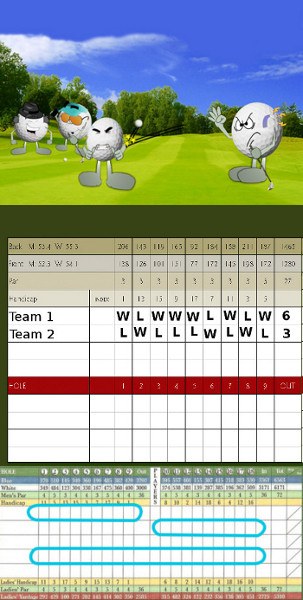- Note: In this section, threesomes and foursomes are considered forms of match play. In a threesomes match, one golfer competes against a two-person team, with each side playing one ball. The two-man team alternates shots – if one plays from the tee, the other hits the next shot, and so on until the team holes out (or concedes the hole, or has their own shot conceded).
- Example: Clyde and Carl are playing another twosome in a foursomes match. Clyde tees off on the first hole, which means Carl tees off on No. 2, and so on through the round. When Clyde tees off, Carl hits the next shot, followed by Clyde, etc.

Golf Rule 29, Threesomes and Foursomes – Simplified Version
In foursomes, two-player teams face off using the same alternate-shot format (sometimes called an alternate shot match).
29-1. During a threesomes or foursomes match, partners take turns playing from the tee and through the rest of the hole. Penalty strokes don’t affect the order of play.
If one player hits a shot that may be lost or out of bounds, his partner is the one to play a provisional ball.
If a player swings at the ball and misses, which constitutes a stroke, it becomes his partner’s turn. Players are not allowed to intentionally swing and miss to give a partner the shot.
29-2. In match play, if a player hits out of turn (i.e., when his partner was supposed to hit), the team loses the hole.
29-3. In stroke play, a team hitting out of order incurs a two-stroke penalty, and the shot is canceled. The player who was supposed to hit then plays the shot from as close as possible to the original spot. If the team doesn’t correct the mistake before teeing off on the next hole, or before holing out if it happened on the last hole, they’re disqualified.
29-1. General
In a threesome or a foursome, during any stipulated round the partners must play alternately from the teeing grounds and alternately during the play of each hole. Penalty strokes do not affect the order of play.
29-2. Match Play
If a player plays when his partner should have played, his side loses the hole.
29-3. Stroke Play
If the partners make a stroke or strokes in incorrect order, such stroke or strokes are canceled and the side incurs a penalty of two strokes. The side must correct the error by playing a ball in correct order as nearly as possible at the spot from which it first played in incorrect order (see Rule 20-5). If the side makes a stroke on the next teeing ground without first correcting the error or, in the case of the last hole of the round, leaves the putting green without declaring its intention to correct the error, the side is disqualified.






